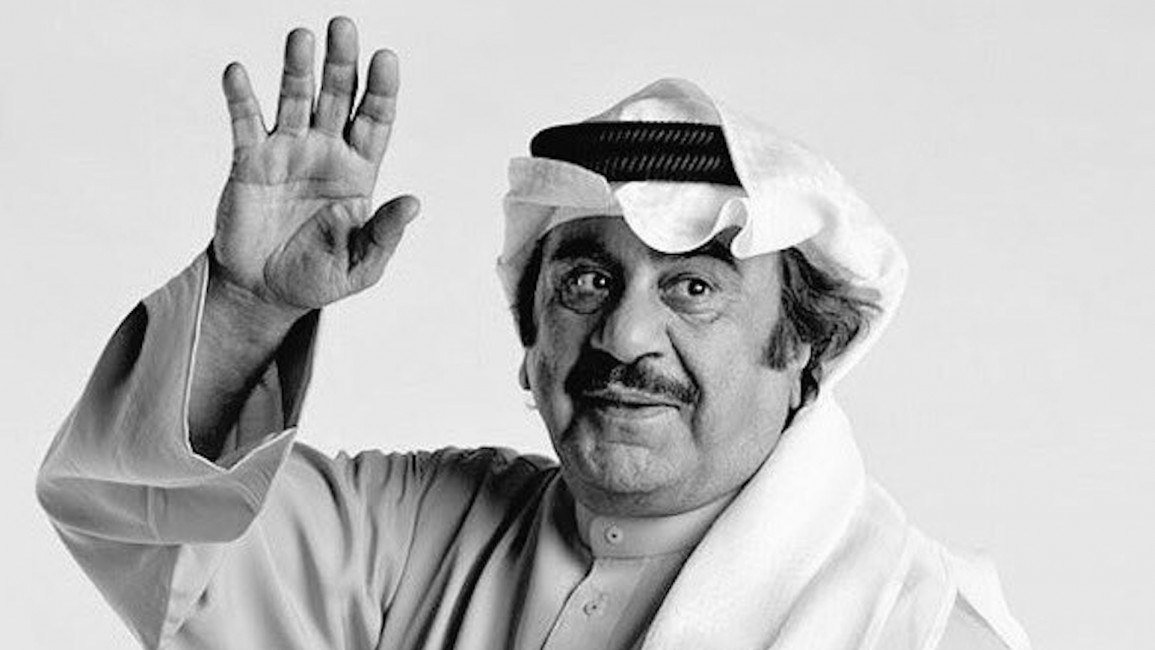
These moments will make you miss Abdulhussain Abdulredha, even if you don't know him
These moments will make you miss Abdulhussain Abdulredha, even if you don't know him
The Kuwaiti actor who angered Saddam Hussein supporters so much they tried to kill him also had a passion for Palestine.
3 min read
Thousands of Arabs have taken to social media to mourn Abdulhussain Abdulredha's death [Twitter]
Abdulhussain Abdulredha's death was not just a loss for Kuwait, but the for the whole of Arab world. He was a playwright, an actor, a singer and above all, a philanthropist.
He was known for making everyone laugh and expressing his political views with his comedy, which even led to him being sentenced to three years in prison when religious clerics filed a lawsuit against him, along with surviving an assassination attempt.
He was a warm character, proven by everyone who has met him. He became the father figure of Kuwaiti comedy, and was hailed as a national treasure throughout his life just as much as he is being remembered after his death.
Here are top four Abdulhussain Abdulredha moments that will make you miss him, even if you aren't too familiar with his past.
1. That time he made random English words hilarious
In the famous play Bye Bye London from 1981, he played a drunk Kuwaiti tourist visiting London.
1. That time he made random English words hilarious
In the famous play Bye Bye London from 1981, he played a drunk Kuwaiti tourist visiting London.
The play touched upon pan-Arabism, but also mocked the way Arab tourists are seen to conduct themselves once they've left their country.
Here he is trying to impress a non-Arab woman with his command in English. This is an absolute must watch, you'll thank us later.
|
|
||
2. His tear-jerking passion for Palestine
"I was at Hyde Park in 1979. I was there regularly to raise the Palestine flag and give speeches on the Palestinian right to return. One time I saw Abdulhussain Abdulredha in the crowd listening to me and he was mesmerised by the Palestine flag behind me," a former PLO activist, who wished to stay anonymous, told The New Arab.
"I got down and spoke to him. I was born and raised in Kuwait so I spoke to him in a Kuwaiti dialect. His smile stretched and I remember him telling me how proud he was that a Kuwait-raised Palestinian is doing this."
"There were only a few of us willing to stand and lead a crowd because as students, there was always a fear of being questioned for political activism in a foreign country when returning to the Arab world, and getting in trouble when we were all here as students."
"When I explained that to Abdulhussain, he simply smiled and said 'as Kuwaitis, we'd be angry at you if you didn't rise up the way you are rising up now'. He then started to chant for Palestine with us."
"In 2003, I saw him again in London. By then, I was no longer a student and I was greying with my oldest child being a teenager. I approached him and I was shocked that he still remembered me," the former activist recalled.
Not only was he passionate about Palestine, but other issues that affect the Middle East like sectarianism, tribalism, discrimination, and the plight of stateless people in Kuwait and beyond.
3. That time he wrote Farhat Ummah and warned against social divisions
Bye Bye London caused a lot of controversy and upset many people. Rather than apologising he wrote Farhat Ummah, which literally means "the happy nation" in 1985 during the Gulf Summit in Kuwait.
He wrote it to present social cohesion in the Gulf, but did so in a way in which he warned against extremism, tribalism, honour culture and other issues that affect the Gulf and other Arab societies.
|
|
||
4. When he mimicked Saddam Hussein
Kuwait was invaded by Saddam Hussein in 1990. While the country was still recovering from the war in 1992, Abdulreda wrote a play called Saif al-Arab which means "the Sword of the Arab" and made fun of Saddam Hussein throughout the entire production.
Not only was Abdulredha's impression of the dictator hilarious, but he - again - touched on politics and war.
Such was the anger from Saddam Hussein supporters that they even reportedly attempted to assassinate the Kuwaiti because of this play.
Such was the anger from Saddam Hussein supporters that they even reportedly attempted to assassinate the Kuwaiti because of this play.
|
|
||


![President Pezeshkian has denounced Israel's attacks on Lebanon [Getty]](/sites/default/files/styles/image_684x385/public/2173482924.jpeg?h=a5f2f23a&itok=q3evVtko)



 Follow the Middle East's top stories in English at The New Arab on Google News
Follow the Middle East's top stories in English at The New Arab on Google News


